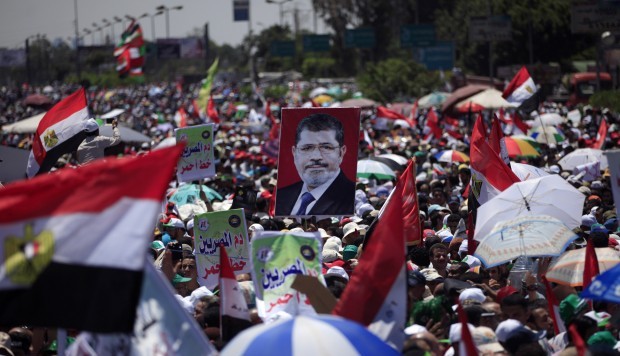Regardless of the results of the forthcoming 30 June demonstrations in Egypt, and whether the opposition succeeds in toppling the president or not, reality says the Muslim Brotherhood’s project in Egypt has failed, and that the Brotherhood will suffer from this failure for many years, in Egypt and the region.
When former President Mubarak resigned, the Brotherhood gave endless promises for democracy, but their promises were empty. The way the Brotherhood has dealt with every crisis in Egypt was tinged with attempts to insult the intelligence of others and exclude them, and by applying the principle of divide and rule, which divided everything in the country.
The Muslim Brotherhood tried to exclude the military, and the time for that was suitable for that, because both revolutionaries and opposition agreed. Then the exclusion of the military became a plan to exclude all; from Azhar and the judiciary, to the media, even the opposition itself; not to mention trying to monopolize the constitution and try to pass it hurriedly, with the exclusion of others.
All this took place during a frightening economic downturn which threatened the Egyptian state as a whole.
What is stunning about each directive or resolution from the ruling authority–or the Brotherhood one can say–is that they clashed with the public and the institutions, causing more division internally, and raising confusion and concern externally.
With regards to the external side, the Brotherhood’s chaotic rule was also stunning in most issues, from the Iranian issue to the Renaissance Dam (Ethiopia), to the Syrian issue. Yet, that was not enough for the organization; with efforts increasing in Egypt to prepare for the 30 June protests, which aim to topple the president, the Brotherhood resorted to methods which implicated them further. Instead of giving political concessions, or try to make reconciliation efforts, they resorted to escalation on the street, and labeling others as infidels and traitors, and threatening to crush their political opponents.
The fact is, If Mubarak and his aides were three days late in their dealing with the 25 January revolution, as we wrote at the time, the Brotherhood today are years late in dealing with reality. One must ask the question: Where are the sensible men of the Brotherhood? Does the Brotherhood want to spill blood in Egypt to be like Assad and Gaddafi? Or do they want to lead Egypt a state to ruin? Did the alleged Brotherhood democracy only mean reaching power, followed by the Khomeini exclusionary approach, which was adopted by the Iranian revolution, and dress that approach with an Islamic cover to guarantee staying in power?
In summary, what history is going to remember is that the failure of the Muslim Brotherhood in Egypt was caused by the Muslim Brotherhood themselves, not their enemies, internally and externally, especially when the Brotherhood decided to rule Egypt with a group mentality, and governed it like an opposition, not a political authority, which applies the principle of good governance, brings together not divides; a principle which gives the impression that the ruler believes in sharing authority, not monopolizing it, and also believes in the sanctity of preventing bloodshed, and not dealing softly with those who label others as infidels and traitors, and threaten the social security of the country as a whole.
Therefore, and regardless of what the 30 June demonstrations produce, reality says the Muslim Brotherhood plan in Egypt and the region has failed, and this is what a small number of sensible people had warned against.

It is difficult not to agree with the distinguished columnist. The MB party has reached its nadir but it is also fortunate in the sense that there is no credible opposition to topple it from power in a democratic manner. The NDP has been outlawed and its eminent leaders have been put behind bars for silly reasons. Consequently it is in disarray. The motley crowd that calls itself the opposition has miserably failed in getting the support of the masses. To rub salt in the wounds , some of them have even sent a letter of support to the “Butcher of Damascus”. The only ray of hope that could save Egypt from impending disaster is languishing in jail for no fault of his own.To rescue Egypt from its turmoil, Mubarak can still play an important role as an elder statesman of international standing provided his dignity is restored.